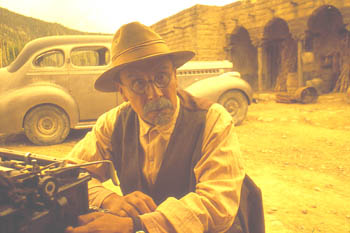![[Metroactive Movies]](/movies/gifs/movies468.gif)
[ Movies Index | Show Times | Silicon Valley | Metroactive Home | Archives ]

Typewriter Cast: Salvador Sánchez tries to keep San Pedro de los Saguaros honest in 'Herold's Law.' Biting Satire Mordita and corruption eat away at the idealistic hero of Luis Estrada's Mexican satire, 'Herod's Law' CALIFORNIA, seeking relief from the follies of the recall election, could ask for no better entertainment than the Mexican scandal and success Herod's Law. Mexicans have known about this 1999 movie all along, though. It is a terrific film ripe with acrid humor. Herod's Law--the title is apparently a Mexican idiom that boils down to "fuck or be fucked"--displays a natty surface. Set in 1949, it reminds one of both American screwball comedy and the last Golden Age of Mexican cinema. Note the throwaway line about how much the hero looks like Tin Tan: a tough-talking comedian popular in postwar Mexican movies. Another reference to Epoca del Oro is the casting of the political boss Lopez. He's played by the son of the man deemed the Clark Gable of Mexico: Pedro Armendáriz Jr. Director Luis Estrada lingers over sleek vintage cars and ladies' stockings. Although he sets the story in the past to distance his rancorous satire, it's clear he fancies that postwar style for its own sake. As a wicked sendup of a corrupt political system, Herod's Law proved a hit in Mexico. Its success was ensured by the efforts of Mexico's (then) de facto one-party system trying to ban the film. Remember that Minutemen song, the gist of which was that if you wanted to feel like a gringo, all you had to do was ask a Mexican who he thought was going to win the election that year? Such was the situation up until Vincente Fox broke a 70-year winning streak for the PRI. Not that Herod's Law mires itself in political intricacies, but the film shows what happens in a country without civil service reform. Where the party bosses control the spoils, they're able to appoint the lowest-rank jobs--and few jobs are of lower rank than the mayorship of the fictional hamlet of San Pedro de los Saguaros. Juan Vargas (Damián Alcázar) is the party-approved bureaucrat at a town dump. He's siesta-ing at his desk when the local PRI jefe Lopez (Armendáriz) selects him for his grade-A patsiness. He's "promoted" to mayor of San Pedro. The previous PRI-appointed mayor perished from some sort of machete accident while carrying the town's treasury in a suitcase. The idealistic Juan promises his helpful, mild-mannered aide, Pek (Salvador Sánchez), that the village's school will be rebuilt. His wife, Gloria (Leticia Huijara), is the good woman behind the temporarily good man. Vargas is urged to close the city's whorehouse, a source of venereal disease and lethal squabbles. But since it is the only really money-making business in town, he soon learns how politics works. Estrada flattens the background. We never get a sense of what the peasants are like until, as if by signal, they rise up and revolt. The way the PRI is portrayed, the peasants never get a word in edgewise, though they have duties. They're required to mill around for empty gestures, such as Vargas' dedication of a wooden pole that will someday have electrical wiring on it. Vargas is not made of very strong, stuff. He's tempted to graft by the surly brothel owner, who's more accustomed to la mordita than a mosquito researcher. ("Mordita" means "little bite," the slang term for a bribe.) He is later exploited by a scheming gringo who comes to live in Vargas' house. Alex Cox plays the stereotypical vaudeville Yankee, even down to suspenders that he clutches in times of stress. Cox, the director of Repo Man, has been working in Mexico since his exposé Highway Patrolman. His Gringo is about at the level of a Mexican caricature in an early Yankee movie; realizing that Vargas won't understand his English, he smiles and says, "All you Mexicans are a bunch of greasers." I suppose there are grounds for offense, and Cox's Yank may be part of the reason this juicy film has been in the can for three years. Were distributors worried about hurting our tender feelings after Sept. 11? In a movie starring a naive cuckold whoremaster who graduates to murderer, it's not particularly offensive to have a Yank blackguard hovering around, scheming a way to rip off Mexico. At a dinner conversation, some of the leading citizens of San Pedro ask El Gringo what he thinks of the recent nationalization of the Mexican oil industry by the former president Lazero Cardenas. "Oh, we'll get it all back," he replies, "and more." Clearly, Herod's Law wasn't made for export alone. Estrada was a brave man to lampoon not just the Mexican government but its corporate string-pullers in the United States. The script gives this witty, sordid tale a smooth transition from bucolic comedy to a finale that owes a lot to Jim Thompson's Pop. 1280. This is an angry movie, but more importantly it's an entertaining one. Our own native politicians probably have as much contempt for the people, but rarely do they get served up as richly as the PRI gets it here.
Herod's Law (R; 124 min.), directed by Luis Estrada, written by Estrada, J. Sanpietro, Vincente Leñero and Fernando Javier León Rodríiguez, photographed by Norman Christianson and starring Damián Alcázar and Pedro Armendáriz Jr., opens Friday at Camera One in San Jose.
Send a letter to the editor about this story to letters@metronews.com. [ Silicon Valley | Metroactive Home | Archives ]
|
From the September 11-17, 2003 issue of Metro, Silicon Valley's Weekly Newspaper.
Copyright © Metro Publishing Inc. Metroactive is affiliated with the Boulevards Network.
For more information about the San Jose/Silicon Valley area, visit sanjose.com.